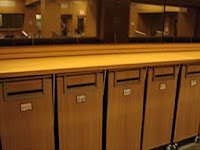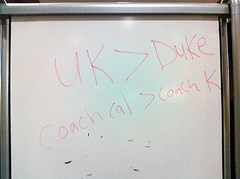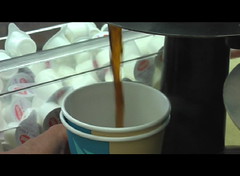 The last Hubbub party I coordinated was probably the best one. For the fourth year, UK Libraries and UK IT welcomed students to the Hub, the information commons in the Young Library. This event is part of K Week, our new student welcome week. We had a killer time slot, though our crowd was somewhat smaller than years past. Every year there are multiple activities going on at the same time, and this year was no different. Some of us speculated that the students might be a bit worn out; one student even told me that he'd had enough free pizza. Who knew.
The last Hubbub party I coordinated was probably the best one. For the fourth year, UK Libraries and UK IT welcomed students to the Hub, the information commons in the Young Library. This event is part of K Week, our new student welcome week. We had a killer time slot, though our crowd was somewhat smaller than years past. Every year there are multiple activities going on at the same time, and this year was no different. Some of us speculated that the students might be a bit worn out; one student even told me that he'd had enough free pizza. Who knew.Our activities went off without a hitch: the Amazing Palm Reading Librarian, the photo booth, video games, board games, and coloring pages were back again. This year IT added a couple of "Minute to Win IT" games which were quite popular. One of the games involved throwing as many floppy disks as you could across the computer lab into a trash can. When asked how much a floppy would hold, one student rather authoritatively said "1 GB!"
In years past (2007, 2008, 2009), this recap post described what didn't work and what we would do differently. This year I am actually stumped at that one. Yes, we ran out of cups again, but our friends at Canteen vending found some in the truck, so no one even knew. Yes, due to the lack of snafus, I had too many volunteers, but most of us got to watch the party and interact with students more than ever.
What will I suggest for future planners? Bring back Gilbert the balloon artist. Street Fighter for Dreamcast is more popular than any modern game. You can't have enough coloring pages and crayons. Some of our simple, initial ideas remain the best ones--the Amazing Palm Reading Librarian and the photo booth are still huge hits.
Thank you to all the staff who have helped over the years to make the Hubbub a successful and memorable student event. We could not have done it without you.
This terrific little video is a great way to end this post:
https://stream.uky.edu/bbstream/WilliamTYoung/TheHubbub2010/index.html



















